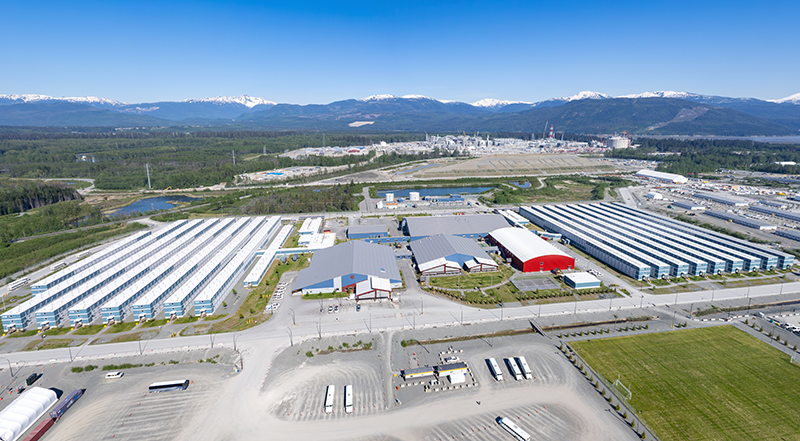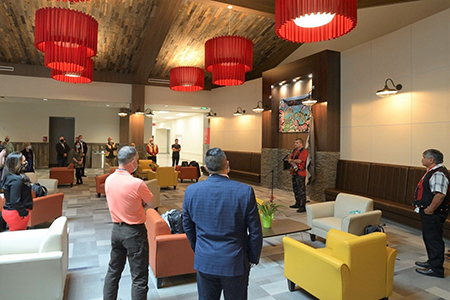
LNG project: The greatest construction industry safety risk isn’t what you think
By Mary Lu Spagrud, Mental Wellness Coordinator, LNG Canada Project
Features construction industry Fluor health and safety Kitimat LNG Canada Project mental illness suicide rates WHO Cedar Valley Lodge is the LNG project’s 4,500-bed onsite workforce accommodation centre. It features single-occupancy bedrooms with ensuite bathrooms, satellite television and wi-fi. Workers also have access to recreational activities, a fitness center and a 24-hour medical centre. All of these facilities work together to support the project staff’s mental health.
Cedar Valley Lodge is the LNG project’s 4,500-bed onsite workforce accommodation centre. It features single-occupancy bedrooms with ensuite bathrooms, satellite television and wi-fi. Workers also have access to recreational activities, a fitness center and a 24-hour medical centre. All of these facilities work together to support the project staff’s mental health. The greatest health and safety risk in the construction industry is not working at heights, with heavy equipment or in confined spaces. It’s mental illness.
The U.S. Centers for Disease Control and Prevention notes that men in the construction industry are five times more likely to die by suicide than from a work-related injury. The construction industry suicide rate is almost twice the average rate for a civilian working male. Among women, workers with the highest suicide rates are also in construction. Similarly, in Canada, male construction workers rank higher than any other occupation for suicide rates.
It is possible, however, to change the paradigm. By embracing the World Health Organization (WHO)’s definition that health encompasses physical, mental and social wellbeing, the construction industry can create a mentally healthy workplace.
The LNG Canada Project, in Kitimat, BC, is a construction site that has adopted the WHO’s definition and elevated the importance of mental wellness. The project has thousands of construction personnel onsite. Due to the project’s scale and location, many of these workers fly to the jobsite and live in onsite accommodations, which can pose additional challenges for individuals and their families.
By increasing awareness, championing peer support and providing easily accessible counselling, the project weaves mental wellness into all aspects of its health and safety programs. The goal is a strong, supportive and inclusive mental wellness culture.
Increasing Awareness
Upon arriving to the jobsite, workers receive a mental wellness welcome package that details a mental health continuum model, as well as available resources. Recognizing that loved ones play a key role in mental wellness, worker’s partners, significant others and family members receive a similar package that provides an overview of what their loved ones can expect onsite, as well as available resources.
Daily morning briefings, called toolbox talks, are a vital part of a construction site’s health and safety program, and reach the entire site. Mental wellness topics are woven into these conversations and designed to address current concerns, dispel myths and/or create a call to action.
Championing Peer Assistance
For someone experiencing wellness challenges, talking to a peer with similar experiences can provide valuable emotional and social support. In addition to support groups for men, women and addiction recovery, mental wellness peer support programs have been established, including Peer Support Pals and Champions.
While not a replacement for medical or clinical care, these programs offer supportive relationships between people who have experienced similar challenges in an empowering, respectful and compassionate environment. Peer Support Pals receive Mental Health First Aid (MHFA) training. They can also receive additional Applied Suicide Intervention Skills training and serve as Champions. Available to support any colleague, program team members wear a decal on their hardhat or clothes for easy identification. More than 80 team members onsite have completed training in one or both programs.
This training supports wellness on and off the jobsite. For example, after receiving MHFA training, four workers identified friends or family members at risk of suicide and connected them to help. In another instance, a team member who had completed the training identified a former colleague who was at risk. A site wellness coordinator was able to intervene, develop a safe plan and connect the former worker to resources.
Providing Easily Accessible Professional Support
Creating an inclusive culture results in team members being open to providing and receiving critical mental health support. Professional counsellors are available onsite daily to de-escalate issues, teach skills, support problem-solving and listen in times of anxiety or stress. In the first quarter of 2023, a substantial number of team members utilized the counselling services available onsite. A 24/7 mental health assistance hotline is also available.
Through the peer support network and access to counsellors, individuals who have been struggling with mental health can receive help, either onsite, in their home communities or at a medical facility. In addition, workers have also been able to identify others who are struggling, including family members, and work with onsite counselors to get the help needed.
Since launching a holistic wellness program in 2021, reports of moderate to severe feelings of anxiety have decreased from 18% to 4%. Workers onsite have also noted improvements in resiliency and life satisfaction.
The construction industry is built by people. Thinking about, talking about and actively addressing mental health in the same way physical health is protected, means the construction industry recognizes, and is willing to invest in, the human strength that has kept the industry alive for centuries.
This article originally appeared in the Featured Stories section of the Fluor Corporation website.
Print this page
